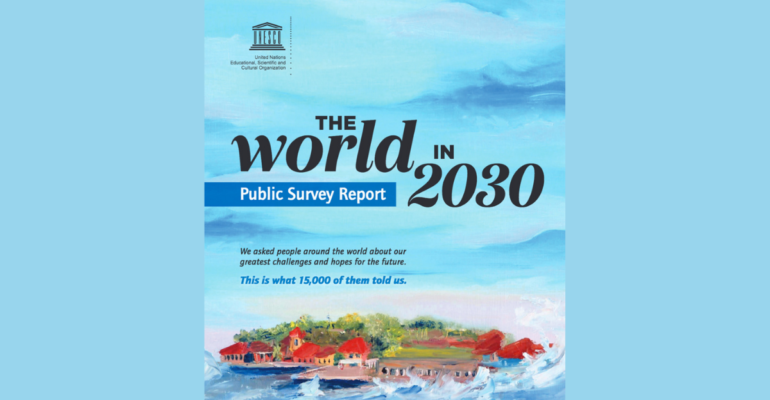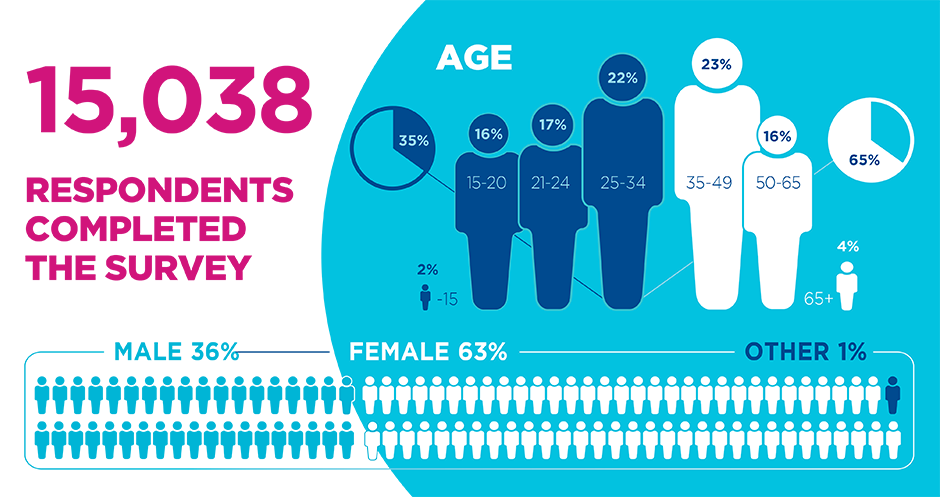Blog by Evelyne Para, SI United Nations Representative at UNESCO.
The results of the survey entitled “The World in 2030“, launched last year by the UNESCO, have fed the thinking of Non-Governmental Organisations since 2021 with one aim – that the programmes implemented meet the real needs of citizens around the world for the coming decade.
Clear priorities emerged from this survey: fight against climate change and biodiversity impoverishment, reduce violence and conflicts, fight discrimination and inequalities, address food insecurity and water scarcity, and equal access to housing and quality education for all.
The Survey respondents
The people who responded to the survey, the majority of whom were women, are convinced that in order to meet the main global challenges of today and achieve the Sustainable Development Goals (SDGs), education in all its facets is an essential solution. Education for sustainable development, education for promotion of non-violence, for cultural tolerance, human rights and gender equality, but also the teaching of critical thinking, and global citizenship. This learning should be based on constructive cooperation between all actors and at all levels: local, regional and global.
Climate change and loss of biodiversity
It’s no secret that our way of life is not sustainable. Our planet faces multiple, interconnected crises caused by human behaviour. We are depleting the planet’s resources. Climate change affects us and all species, damaging ecosystems and causing unprecedented environmental degradation. 2020 was the hottest year on record, natural disasters are increasingly frequent and violent (cyclones, flooding, or excessive drought etc). The alarming long list puts economies, livelihoods and quality of life at risk. It also disproportionately affects the most vulnerable, exacerbating inequalities, and poses a major threat to global peace and security.
Those who responded to the survey say they are confident in the science; they are in favour of investing in green solutions, for example through the sustainable use of renewable energy sources. They want the risks of natural disasters to be assessed and better managed. They believe that the complexities of these issues demand greater progress in educating all people about sustainable development, in awareness raising and training from an early age, in order to enable societies around the world to better understand, mitigate and adapt themselves to these changes with dramatic consequences.
Education for sustainable development
Transformative education is the reliable solution to help change the way we live and take care of our planet. Yet all learners today are not provided with tools and knowledge to take action for our planet.
At the World Conference on Education for Sustainable Development held 17-19 May 2021 in Berlin, Germany, policy makers, professionals from the global education and sustainable development communities, NGOs and representatives of civil society, all recalled this pressing need.
On this occasion, UNESCO launched a campaign, “Learn for our planet”, calling on Member States to invest in education for sustainable development, which is an essential catalyst to all SDGs and to start acting by learning for our planet.
The other major challenges
– Violence and conflict: Those responding to the survey are concerned about radicalisation and terrorism, the risk of global conflict and nuclear weapons, as well as violence against minorities and vulnerable groups, the rise of online hate speech and harassment. Four in 10 people (38%) say they feel that intercultural or religious tensions are getting worse. Violence against women and girls ranks fourth globally, but this concern ranks first in some regions such as Latin America.
– Discrimination and inequalities: the main concerns relate to discrimination against women and minorities. This discrimination constitutes a violation of human rights, hindering equal access to opportunities, particularly in education, labor market and access to decision-making positions. Important recommendations were recalled in UNESCO Global Education Monitoring Report 2020 entitled Inclusion and Education.
– Food insecurity, shortage of water and housing: the main concern here is by far the lack of safe drinking water, but concerns also relate to the lack of safe or good quality food.
To find out more, read the full report of the UNESCO “The World in 2030” survey HERE



For all countries : education for equality,against machism and prostitution(school,tv,pub,radio…) same work,same rent
For countries in developpement:
Water, education for health and agronomy